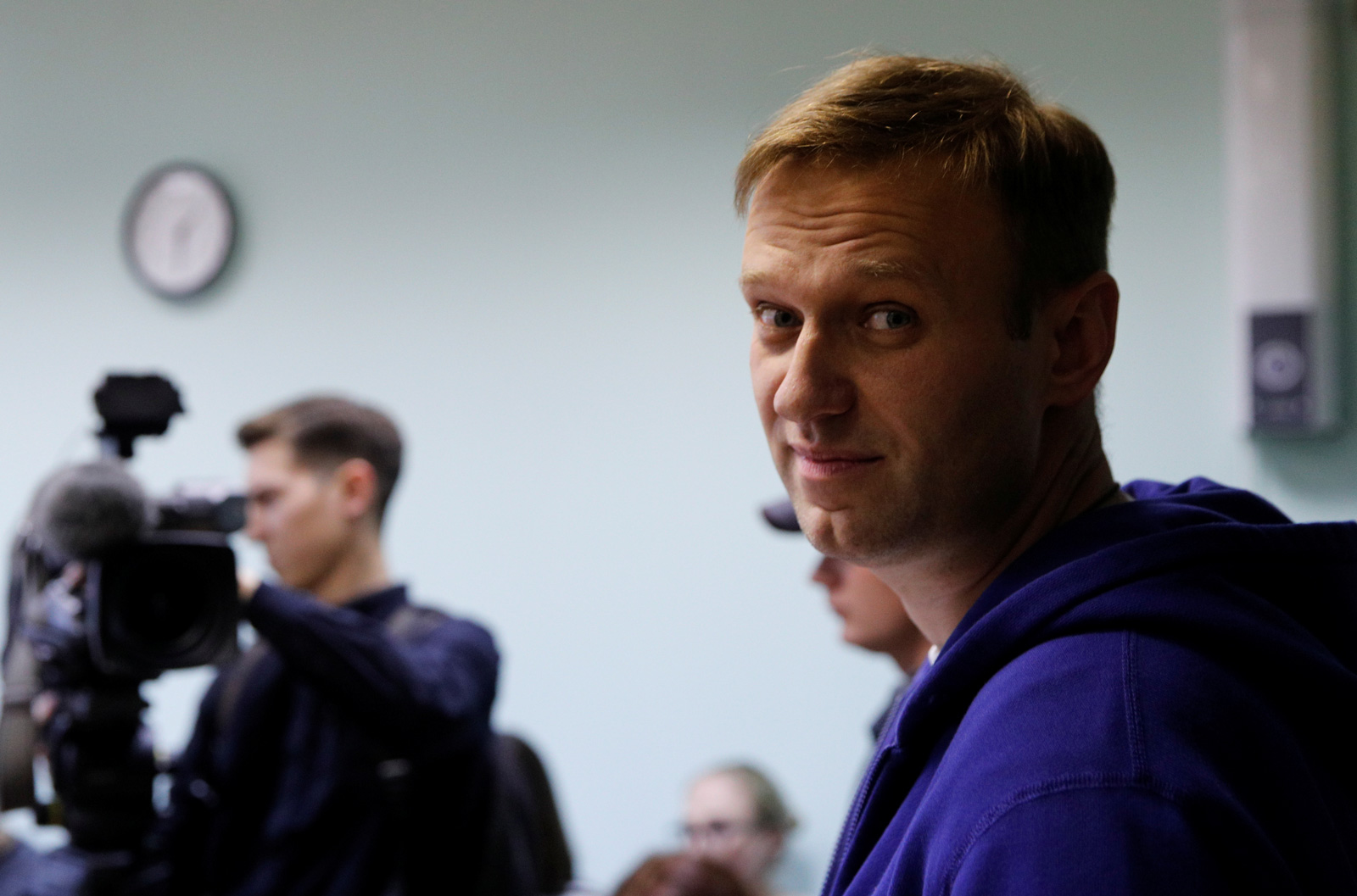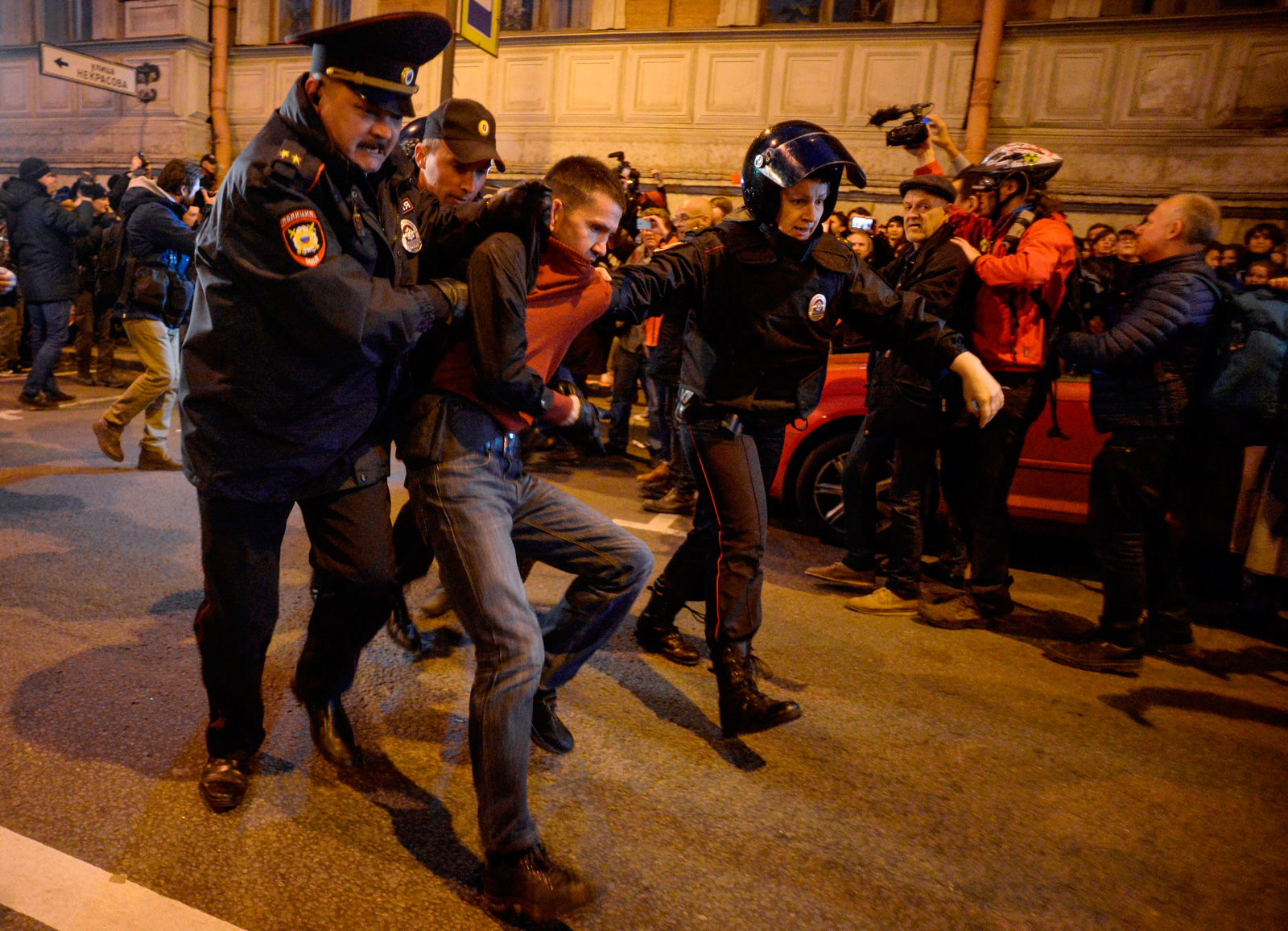After late September’s arrest of Aleksei Navalny, the charismatic anti-corruption crusader who has declared himself a candidate for the Russian presidency, some Russian commentators thought that the Kremlin had made a serious mistake. Aleksandr Gorny, a blogger for the radio website Ekho Moskvy, observed: “Navalny influences the minds of millions, more precisely tens of millions, of Russians, mostly young people…. Those who arrested Aleksei yesterday do not understand that they are unleashing the mechanisms of the self-destruction of the regime…. In arresting Navalny, the authorities only raise his ratings among youth and [other] supporters.” From a long-term perspective, Gorny is probably right. But as an immediate strategy to thwart the challenge from Navalny, the Kremlin’s decision was a success.
Navalny and his supporters had called for mass demonstrations this past Saturday, October 7, to protest the Kremlin’s position that Navalny cannot be on the presidential ballot next March because of his past criminal convictions. The rallies were timed to coincide with President Vladimir Putin’s sixty-fifth birthday, and Navalny had planned to appear in Putin’s native St. Petersburg for the occasion. Although Navalny urged followers to carry on with the protests despite his arrest, the turnout was much lower than expected, especially in comparison with the protests he organized last spring. A few thousand demonstrators took to the streets in St. Petersburg, and close to seventy were arrested, but in Moscow, where it was raining heavily, the crowd was estimated at between 700 and 2,000 only; numbers were considerably lower in other cities.
This is the third time this year that the authorities have put Navalny behind bars. Rather than intimidate him, the arrests seem to embolden him. After his twenty-day sentence was announced in a Moscow courtroom on October 2, Navalny tweeted in his characteristic taunting fashion: “Old man Putin is so scared of our rallies in the regions he’s decided to make himself happy by giving himself a little gift for his birthday. It’s safer this way.” His campaign manager, Leonid Volkov, also in jail for twenty days, and on a hunger strike, tweeted: “Let us go, you bitches, let us conduct a normal campaign. Compete [against us] with ideas and meetings, not courts and arrests.”
Whatever the resolve of Navalny and Volkov, it could not make up for Navalny’s absence at the protests. Navalny’s campaign has been criticized for focusing more on him as a leader than on concrete issues, and Saturday’s rallies may be a case in point. Moreover, Navalny’s main theme is anti-Putinism, but as the political expert Konstantin Kalachev said, people want more: “They are demanding a systemic renewal of political life in Russia.” Kalachev added that the organizers of the protests offered no solutions to the urgent problems the country faces.
To be fair to Navalny, he does have a program—hefty taxes on the oligarchs, decentralization of decision-making, judicial reform, and a huge cut in military spending, among other things. And in rousing campaign speeches across the country, Navalny reminds ordinary people of how starkly their dismal economic circumstances contrast with life in the West. After visiting Arkhangelsk recently, where many of the streets are unpaved and some people lack running water, he wrote on his website: “Don’t worry about Catalonia [where a controversial referendum was taking place].… Everything will be fine in Catalonia. And in Barcelona and Madrid, where people receive salaries five times more than you and sit in the evenings on restaurant verandas drinking coffee and no one walks around with buckets of water as in Arkhangelsk, where I had a rally today.”
Navalny makes it clear to all who listen that the Kremlin elite is robbing them of what is rightfully theirs. Videos on YouTube produced by Navalny’s Anti-Corruption Foundation offer millions of Russian viewers a glimpse of life at the top in their own country. These exposés of the lavish wealth of Putin and his cronies have created a furor in the Kremlin. After Navalny revealed the extensive corruption of Russia’s prosecutor-general, Yuri Chaika, and his family in late 2015, Chaika wrote a blistering letter to the Russian daily Kommersant, claiming that Navalny’s films were financed by the businessman William Browder. (Browder was a key lobbyist and advocate for the Magnitsky Act, which introduced sanctions for Russian officials responsible for the death in prison of Sergei Magnitsky.) And Chaika’s close ally, Aras Agalarov (also a friend of Donald Trump), rose to Chaika’s defense, writing an impassioned op-ed for the same paper, in which he compared Navalny to Hitler’s propaganda chief, Joseph Goebbels.
In a new film posted two weeks ago, Navalny went after a well-known television journalist, Vladimir Solovyov, who slavishly panders to the Kremlin. Navalny begins the film by saying: “Today we are talking about something that is worse than Putin’s corrupt regime itself. We are talking about propagandist television journalists, lackeys of the regime whose lies hold the regime together even more than the police or the national guard. They are Putin’s frontline soldiers.” With his usual meticulous documentation, Navalny shows us Solovyov’s Moscow apartments, his dacha, and his huge villa on exclusive Lake Como in Italy. Taken together, Navalny estimates the journalist’s net worth to be over a billion rubles, and that, he says, does not include likely hidden assets. The film has a punch line: although he constantly decries Europe and the West, Solovyov has established residency in Italy. As Navalny notes, “It is always good to have a backup landing place.”
Advertisement
Saturday’s lower than expected turnout is not necessarily a harbinger of what is in store for the future. According to Nikolai Mironov of Moscow’s Center for Economic and Political Reform, “It is too early to draw conclusions, but I think protests will continue and their intensity will increase as we approach the presidential elections.” The main hurdle for Navalny, of course, is to get on the presidential ballot, from which he is barred by the Constitution because of convictions for embezzlement in two separate cases. The charges, for which Navalny is serving suspended sentences, are clearly bogus, but Russian courts have repeatedly denied Navalny’s appeals against the convictions.
In the view of Yulia Latynina, a harsh Putin critic who was forced to flee Russia last month because of threats to her life, the Kremlin faces less pressure after Saturday’s events to allow Navalny to compete for the presidency—which it wants to prevent at all costs. If Navalny were allowed to run, Latynina says, he could win at least 30 to 40 percent of the vote in Moscow, and even more in other regions. The economy is still in the doldrums and the Kremlin can no longer rely on state-controlled television as a propaganda tool. According to Latynina, the audience for the nation’s main news program, Vremia, is now only five million, and the average age of those viewers is sixty-five. By contrast, Navalny’s documentary film exposing the corruption of Prime Minister Dmitry Medvedev, which appeared early this year, had twenty-five million viewers on YouTube.
Most independent Russian political observers agree that Navalny poses a serious challenge to the Putin presidency, even if he cannot run in the March elections. The journalist Evgenia Albats recently hailed Navalny’s country-wide campaign as almost unheard of; for the first time in eighteen years, Russia has an alternative to Putin. As she points out, Navalny is undermining the Kremlin’s long-held monopoly on information: “The regime… aims to prevent people in different parts of the country from knowing that they have similar problems, because when they realize that they have similar problems, they will ask themselves: ‘Maybe, the problem is not just my crooked governor? Maybe the fact is that the person who is in Moscow has long since overstayed all possible terms?’”
In a recent post on his website, referring to the president’s supposed approval polling, Navalny commented: “The celebrated 86 percent rating [of Putin] exists in a political vacuum. It’s like asking someone who was fed only rutabaga all his life, how would you rate the edibility of rutabaga?” He completed the analogy by warning his readers that “if you do nothing, we will be fed this damn rutabaga for the rest of our lives.”
As several Russian commentators have pointed out, the Kremlin does not know what to do about Navalny, which is why it has been giving mixed signals. Navalny was allowed to hold rallies in numerous cities—including Khabarovsk, Vladivostok, Murmansk, and Arkhangelsk—but then was prevented by his arrest from attending a campaign event in the small city of Nizhny Novgorod and later St. Petersburg. Police have arrested the head of Navalny’s St. Petersburg campaign headquarters, Polina Kostyleva, twice in the past week, but she was released with only fines and court-ordered work hours. Navalny and Volkov are kept behind bars but permitted to post incendiary messages on the internet. Some have speculated that these inconsistencies, along with unusual leaks to the media, represent serious disagreements within Putin’s elite over how to handle Navalny, as well as over what the future holds for Putin himself. Putin is poised to win the March 2018 election, no matter who opposes him. The Kremlin controls not only who gets on the ballot but the entire electoral process, and it uses a variety of fraudulent means, including ballot-stuffing, bribery, and coercion to ensure the results it wants.
Advertisement
However Putin manipulates the elections, he cannot rule Russia forever. Yet he appears to have no exit strategy. Andrei Kolesnikov of the Carnegie Moscow Center explained the predicament in a recent interview: “Let us say, 2020 is approaching and Putin says, ‘I am leaving.’ Who will protect his regular pension, ensure that he does not face risks?” Not Navalny. And if, once he is out of jail, he continues to attract supporters who are fed up with the corruption that permeates the Kremlin and want their voices to be heard, Putin’s re-election next year will be a hollow victory. As Kolesnikov predicts, “On March 19 [the day after the election], we will not see a lone motorcade on the streets of Moscow, but also protests.” This is why the Kremlin is tearing its hair out over Navalny: the prospect that a day will come when the Russian people realize they are sick of rutabaga and demand something else.




